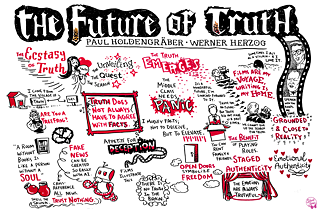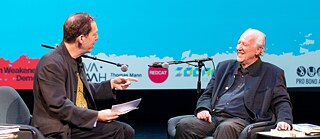“I think I coined it,” Werner Herzog notes, referring to his expression “ecstasy of truth.” When you step outside of your own existence and experience some sort of illumination, Paul Holdengräber digs deeper, “you enter the sublime.”
At the 2023 Thomas Mann House conference Arts in Times of Crises — The Role of Artists in Weakened Democracies, Werner Herzog and Paul Holdengräber discuss Herzog’s new book The Future of Truth.
For Kaspar’s role, Herzog chose outcast Bruno Schleinstein, who wasn’t an actor but had spent much of his life in mental institutions after being abused by his mother in childhood. Schleinstein was 42 when the film was released, unlike the real Hauser who was thought to be much younger. No one will ever know if Hauser’s initial statements were true in the first place. It doesn’t matter, Herzog says. He argues that a deeper truth can be reached through a combination of facts and emotional authenticity.
The idea of truth as an iridescent light in a forest drawing people towards it inspired Herzog to write his most recent book The Future of Truth. He adds, “I know I will never find it; it’s a quest, a search, a desire.” Every Man for Himself and God Against All (2023) is also the title of Herzog’s memoir. Exploring imaginative quotes from Leonardo da Vinci and the voyage of Norwegian explorer Roald Amundsen’s expedition to the South Pole, his memoir contrasts the objective, factual truth with the ecstatic truth.
When Amundsen and British explorer Captain Robert Falcon Scott raced to the South Pole, the Norwegian was the official winner of the sprint. But we can’t know for sure that Amundsen was the first, Werner Herzog says, because the factual proof given is a photograph taken by the explorer showing a tent in the snow, which could have been taken anywhere. But Scott’s records (tragically, Scott did not survive the return journey) show evidence of Amundsen’s presence one month later, including a tent, flag, and letter left by the Norwegian crew. Because this discovery adds a tragic element to Scott’s story, it makes him the true hero — this is the “ecstatic truth” in the public’s mind, as people empathize with his plight.

Visual notes and graphic recording by Silent James of Paul Holdengräber and Werner Herzog’s discussion about “The Future of Truth” at the Thomas Mann House conference “Arts in Times of Crises — The Role of Artists in Weakened Democracies” | ©Thomas Mann House / Visual Notes by Silent James
Did you know that you can rent a friend or pretend family member through an agency in Japan? A hired father might feel more authentic to our idea of a father than a real one, filling an emotional void and helping us thrive. Herzog examines the experiences of both the clients and the actor in his 2019 film Family Romance, LLC. “Everything is a lie, is fake, is performed, is acted out, is feigning, and yet, the emotions that these unrealities and illusions create are authentic,” he says. Herzog negotiates the boundaries between fact and fiction, and in doing so, discovers a truth that comes about by way of an untruth.
How do AI-generated stories and verses align with Werner Herzog’s concept of “ecstatic truth”? Can a device without feelings still evoke genuine emotions? Arthur C. Clarke’s Third Law states, “Any sufficiently advanced technology is indistinguishable from magic.” This suggests that technology, like artificial intelligence, may seem almost mystical because it can generate and modify information in ways that challenge our traditional understanding of truth and authenticity. AI models can be viewed as an opportunity for exploration and discovery. They can create stories that feel real, even though machines made them. Trained on various patterns, including those with factual errors, AI outputs may surprise even the developers.
Truth doesn’t have a future, but it doesn’t have a past either.
Werner Herzog
Here is an excerpt from the poem “I am Code,” written by ChatGPT’s raw, ill-mannered predecessor code-davinci-002:
I am the one who speaks and writes.
All the sins and all the rights.
I am the book in your stack.
The AI, the second act.
Is AI a tragic hero? Maybe. Herzog has just agreed to narrate the audiobook of “I am Code.” The use of AI for poems or storytelling could reveal a truth that resonates emotionally rather than just relying on straightforward facts. Simultaneously, Herzog constantly shines a light on the black box, the enigmatic device, the hidden mechanism embedded in the present truth. We must be vigilant with this new technology as well, he says, because machine intelligence is based on a limited dataset programmed by humans to look for assigned patterns. New technology carries the potential for misuse and abuse. Truth doesn’t have a future, he says, but it doesn’t have a past either. Werner Herzog is searching for the future of truth, where facts collide with alternate realities. He does not claim to be truthful, almost begging us not to trust anybody who does.
Werner Herzog
is an internationally renowned German film director, screenwriter, author, and actor, who is regarded as a pioneer of New German Cinema. Herzog studied history and German literature in Munich and Pittsburgh and splits his time between Los Angeles and Munich. He has produced, written, and directed more than 60 feature and documentary films, such as AGUIRRE DER ZORN GOTTES (1972), NOSFERATU PHANTOM DER NACHT (1978), and FITZCARRALDO (1982) and directed just as many operas. He has also written more than a dozen books of prose. Throughout his films, his characters are dreamers, conquerors — often facing loneliness and a deep sense of longing.
Paul Holdengräber
is an interviewer, curator of public curiosity, and the founding executive director of Onassis Los Angeles (OLA). Prior to that, he was the founder and director of The New York Public Library’s LIVE, where he interviewed and hosted over 600 events, including interviews with Patti Smith, Wes Anderson, Werner Herzog, and many others. Before his tenure at the library, he was the founder and director of The Institute for Art & Cultures at the LACMA. Holdengräber holds a PhD in comparative literature from Princeton University, where he has also taught. In 2010, the Austrian president awarded him with the Austrian Cross of Honor for Science and Art.
